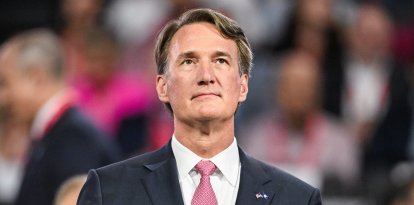James Baker III's history and legacy: "The man who ran Washington" turns 93
Although warned from a young age to avoid politics, he ended up managing four presidential campaigns and serving as chief of staff, secretary of the treasury and secretary of state.
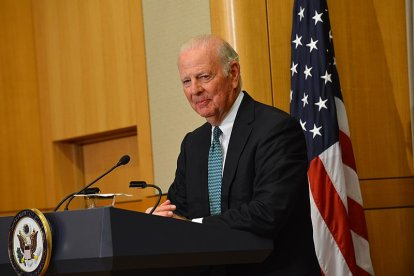
James Baker III/Wikimedia Commons
A few years ago at Lake Como, a political conference took place that brought together officials and former political officials from many different countries. Among those in attendance was Bob Shrum, a historic Democratic strategist who had recently helped Bhud Barak come to power in Israel. At one point, he was asked what Barak could do to move the peace process forward. Shrum paused for a moment, turned to a man, pointed at him and replied as follows: "You should ask James Baker that question, because I'm just a campaigner. He campaigns and governs".
Something similar was said by Frank Donatelli, White House director of Political and Intergovernmental Affairs from 1987 to 1989, who worked with Baker during his time as chief of staff. In an interview with Voz Media, he assured that he "was the last of a line that participated both in the government and in the campaign. As such, it was an important bridge to ensure that candidates like Ronald Reagan and George Bush connected their campaign rhetoric with their presidential actions." After this double outsourced introduction, the question arises on its own.
Who is James Baker?
James Adison Baker III was born on April 28, 1930 in Houston, Texas. A member of an important family of lawyers and bankers in the area, he received advice from an early age that he could not fulfill: "Work hard, study and stay out of politics". That was the maxim of his grandfather, Captain James Adison Baker I. Although unable to follow that maxim, he titled his autobiography with that phrase.
His entry into politics came really by chance, given that, until the age of 30, he had not shown any interest in the subject. It all began in 1959, when a new couple moved with their five children and their business to Houston. Baker quickly formed a friendship with the father of the family, one George Herbert Walker Bush. The relationship was based on tennis, "a lot of tennis," according to Barbara Bush.
While they enjoyed playing singles, they turned out to be great doubles partners. Although serving was not exactly the virtue of either of them, Bush's volley complemented Baker's ground game very well. When the latter's first wife, Mary Stuart McHenry, died in 1970, his friend tried to help distract him by summoning him to work on his Senate campaign. Although Bush was soundly defeated by then incumbent Lloyd Bensten, he gave his friend the first taste of politics in his life. Evidently he liked it.
"Has anyone ever told you that you look like James Baker?"
Thanks to Bush, whom he affectionately nicknamed El Jefe, he got a job in the Gerald Ford Administration as Undersecretary of Commerce. Full-time law practice was a thing of the past. His promotion was very sudden and before he remembered where he was he ended up managing the 1976 presidential campaign for the president. The first battle was not against Jimmy Carter, the eventual Democratic nominee, but against Ronald Reagan, who sought to retain the Republican nomination.
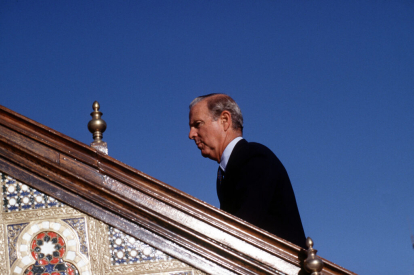
Wikimedia Commons
The actor's charisma and oratory put the campaign on the ropes. Reagan managed to carry a good number of states, including Texas. According to Baker, the fact that Ford tried to eat a tamale without unwrapping it may have had something to do with the defeat. Negotiations with delegates were endless even at the Republican National Convention. The final tally declared the president the winner, but his joy was short-lived, as he was defeated in the general election by Carter. Looking at the glass half full, the close election would give Baker a very good reputation in Washington DC.
Now a little more enchanted with politics, he was encouraged to seek elected office for the first and only time in his life, that of Texas attorney general. Already in candidate mode, one afternoon he approached a group of people who were gathered in the street, with the simple intention of handing them some pamphlets. Before he could introduce himself, a man from said to him,"Has anyone ever told you that you look like James Baker?" "Followed," replied the candidate, still in incognito mode. "Doesn't that bother you?" the man replied, making him understand that the race was lost in a still Democratic state.
Life did not give him time to digest the defeat. Just days after the results were known, a familiar voice recruited him to take over his campaign for president in 1980. Bush boasted a resume full of government experience and his only obstacle to the nomination was none other than Ronald Reagan. It was the second time Baker had mounted a campaign against the former California governor.
Visibly with little chance of rebounding in the primary, Baker had a plan for his friend to be considered for running mate. Days before the election in California, his rival's home state, he publicly announced that they had run out of money, with the clear intention of competing and leaving a nice feeling in the rival bunker. Bush learned the news at the same time as the public, from the newspapers.
On the day of the convention, Reagan's filter for choosing his running mate was not very complicated: anyone but Bush. Hope was lost. However, none of the candidates seemed to fit the profile they were looking for, someone to balance the formula.
When Ed Meese, chief of staff for the Californian's campaign, met Baker in the hallway already with luggage in hand, he suggested he wait a bit before leaving. Only Baker, Bush and his wife Barbara were in the room when the phone rang. It was Reagan himself, who wanted to speak for a moment with the man who was his archenemy until a few minutes ago. Before passing the phone, Baker whispered, "say yes."
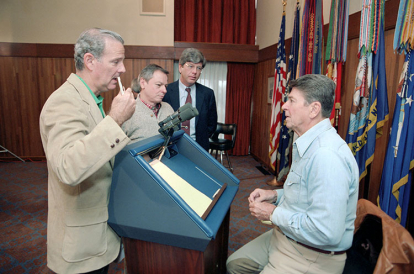
Wikimedia Commons
The formula would arrogate the Carter-Mondale formula in November and leave Baker with nothing clear on the horizon. A day after the election, again packing his bags but this time at the Century Plaza Hotel, the phone rang again. "I want to talk to you before you go back to Texas," he heard directly from the president-elect. What I wanted was something unusual. He proposed to the man who tried to defeat him twice (once he succeeded) to be his White House chief of staff.
Arrival at the White House
Despite tears from his new wife, Susan Garrett, Baker accepted the job in which he applied a maxim used by his father. Entitled "the 5 P's", it translates to "prior preparation prevents poor performance". The new official was the backbone of "The Troika," the team he formed with Meese himself and Mike Deaver. His negotiations with Congress were vital to the Reagan administration's legislative achievements, such as the Gramm-Latta Budget, the Economic Recovery Tax Act of 1981, the Social Security Amendments of 1983 and the Tax Reform Act of 1986 as Secretary of the Treasury.
In these last two bills the strategy was the same, "convene a small number of leaders from both parties with experts from the agencies to draft a bill that everyone can live with." On Capitol Hill he brought out his reputation as a methodical and political chess player. According to his own adversaries, he knew how to use the power and influence of the presidential office very well to get votes.
In his memoirs, he confessed that his greatest responsibility as chief of staff was "protect the president"He also learned during this time that "proximity is power" and that the staff's job should be to prioritize the head of state's time. Moreover, during this time he learned that "proximity is power" and that the staff's job should be to prioritize the head of state's time.
Regarding the aforementioned legislative successes of the Reagan Administration, he asserted that"pragmatism without principle is cynicism, but principle without pragmatism is often impotent. To turn ideas into policy, a leader must be prepared to fight hard - yes - but also to accept victory on terms that are winnable even if far from perfect. That is the reality of politics.
The position he most enjoyed in his career
Ronald Reagan reluctantly accepted Baker's resignation in 1988, when not, to lead another presidential campaign, George Bush's second. Once his triumph over Michael Dukkakis was consummated, El Jefe offered him the position of Secretary of State, a position that would bring him much joy.
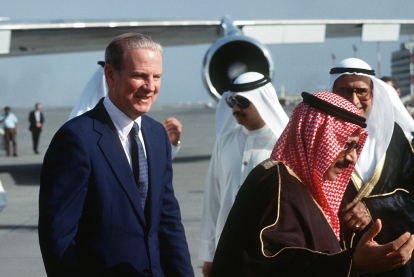
Wikimedia Commons
With the fall of the Soviet Union in process, the challenge was enormous. "We understood from the beginning that we would have two historic responsibilities. The first was toexercise leadership to bring the Cold War to a peaceful end. The other, equally important, was to set a new direction for the post-Cold War era," he said in his autobiography.
Baker was the architect of Bush's austere response to the Fall of the Berlin Wall, later to face negotiations with Mikhail Gorbachev on the fate of Germany. In particular, the concern was that the European country might join NATO, something they finally achieved after the visit of the Soviet leader DC.
End of the Cold War
That diplomatic visit featured one of the favorite moments of Baker's career. At that time, Soviet officials were not allowed to go more than 40 kilometers from New York or Washington. Despite this, the then secretary of state took Eduard Shevardnadze, foreign minister of the USSR, to a town in Wyoming. Over the course of three days and nine meetings in a cabin, they discussed "chemical weapons, arms control and other East-West issues. Between sessions, we talked informally about growing tensions within the Soviet Union and other sensitive issues."
However, his biggest surprise came when it was time for the formalities. "At the end, I gave him a pair of cowboy boots (symbol of the place) to commemorate the conversations, and he gave me an enamel with the image of Jesus Christ. 'You see, even we communists are changing our worldview.'," Baker recalled.
Many historians agree that the Cold War ended with the fall of the wall. Baker has another position. "The fall of the Berlin Wall was very symbolic, but in my opinion the Cold War ended nine months later. With me at his side in a Moscow airport on August 3, 1990, Shevardnadze announced that the Soviet Union would join the United States in condemning the invasion and imposing an arms embargo on Iraq. 'This aggression is incompatible with the principles of the new political thought and, indeed, with civilized relations between nations.' It was a memorable moment," he relived in his memoirs.
Donatelli celebrated this milestone by noting that he "directed the end game that saw the collapse of the Soviet Union and the fall of the Berlin Wall, all without a shot being fired."
James Baker turns 93 this April 28. Apparently destined to be a "statesman," he managed four presidential campaigns, was instrumental in the election of his close friend's son in 2000, and served his country as undersecretary of Commerce, chief of staff, secretary of the Treasury and secretary of state. According to Donatelli,"he was the franchise player of the Republican Party, the indispensable man who established a legacy in campaigning and governing." Quoting a historic quote from the former head of both, Ronald Reagan, he defined Baker's career as follows: "Not bad. Not bad at all.
You might say, to paraphrase The Gipper, not bad for someone who from an early age was told to stay away from politics.
RECOMMENDATION








